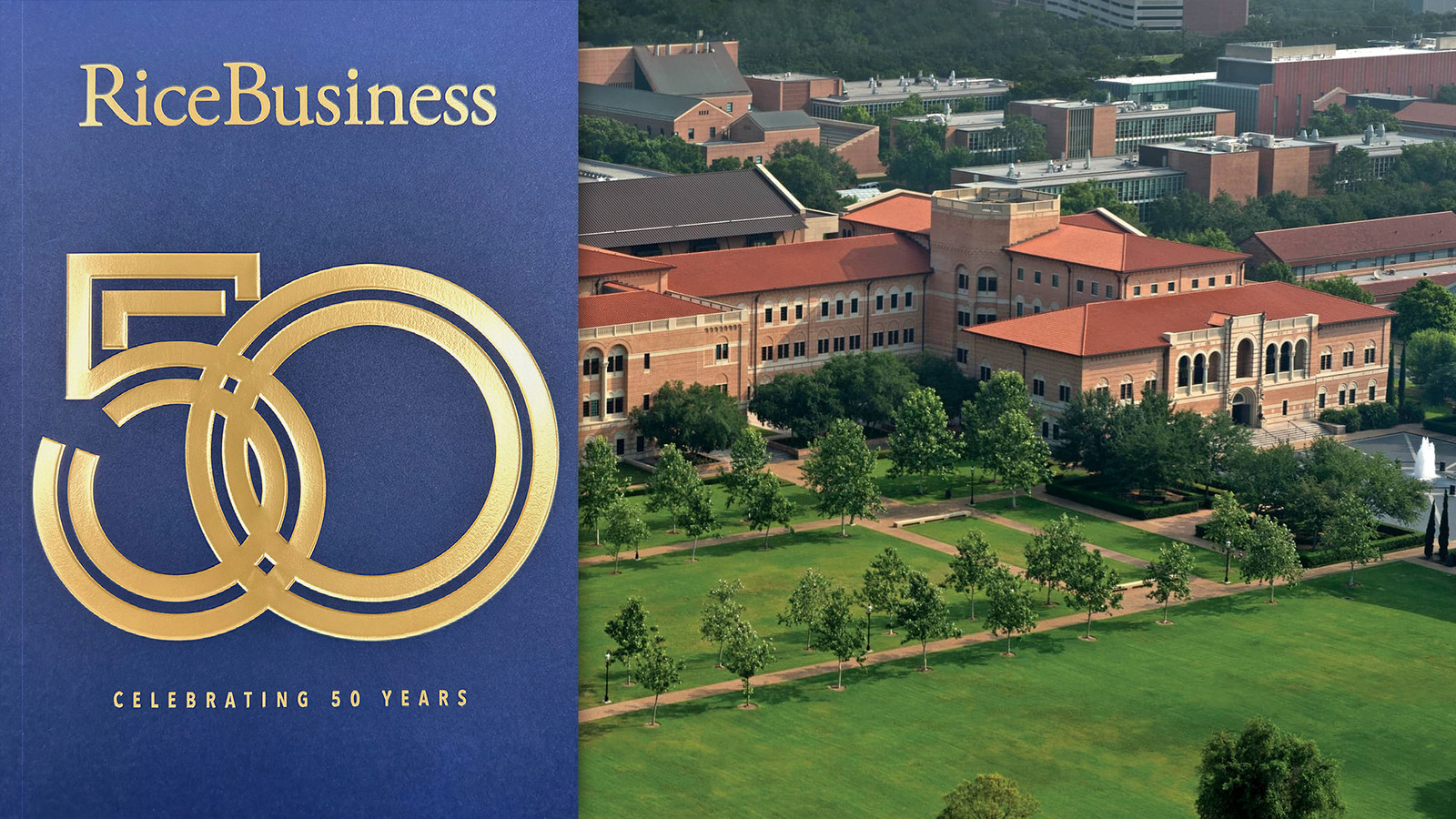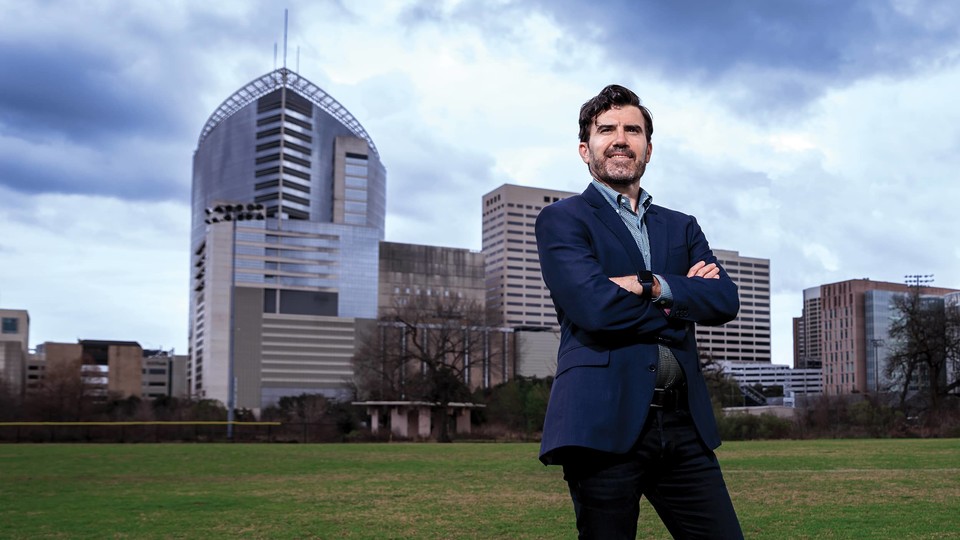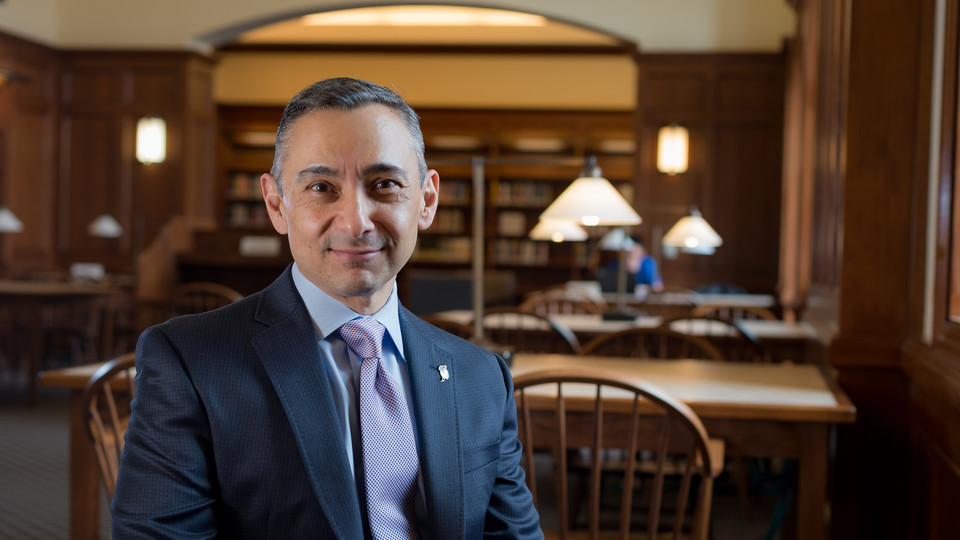A Glittering Opportunity

Looking Back on the 50 Years That Shaped Rice Business
Thoughts of a business school at Rice University were in the minds of administrators and influential business leaders in Houston as far back as 1958. And even earlier if you count the ambitions of the university’s first president, Edgar Odell Lovett, who knew a robust Houston business community meant success for Rice. As Houston grew, so did the need for a school of business to serve it. With a $5 million gift from Houston Endowment in 1974, that dream became the Jesse H. Jones Graduate School of Administration.
By the fall of 1977, with its first dean, three full-time faculty and four adjuncts, the school matriculated 55 students — 23 in the management program and 32 in the accounting program. Classes moved from Sewall Hall to Herman Brown Hall for Mathematical Sciences after that first year, and to the newly built Herring Hall by 1984 and McNair Hall in 2002, where we now house 65 tenured and tenure-track faculty, 155 staff and teach more than 1,700 MBAs, PhDs, MAccs and undergraduates a year.
The Jones Graduate School of Business — it had a name change from Administration to Management in 1998 and to Business in 2009, plus a new nickname in 2016 — has been no stranger to transforming itself to meet the evolving world of business. In April 1996, after an external review committee found that this “glittering opportunity” was not meeting its potential, the school was faced with a choice: “embark on a course of becoming recognized for world-class distinctiveness and quality in management education … or close the doors.” We chose the former.
We have survived the oil bust, recessions, economic crashes and hurricanes, and we have witnessed the birth of the Internet, the personal computer, the iPhone, and Amazon.com. Rice Business has seen a lot in 50 years. And so have our graduates. Here are just a few of the moments that shaped us, the business world and Rice Business.

From the Ground Up
In 1974, after funding from Houston Endowment establishes the business school, a search for the first dean began. A look at the leaders who have helped make Rice Business what it is today.
1976 – 1980
Robert R. Sterling is named first dean in 1976. By the following year, the first class matriculates and, the year after that, the Board of Advisors (originally called the Council of Overseers) is formed and begins meeting. Sterling also creates an Office of Executive Development, which begins offering seminars in management and financial planning, and soon expands to hosting short courses and special events such as the Houston Entrepreneurship Conference. He appoints an assistant dean for admissions and placement, and head of the Master of Business and Public Management program.
1981 – 1987
Francis D. Tuggle becomes dean after a year of interim responsibilities. He names the school’s first director of admissions and student affairs as well as the head of a career office, who creates an alumni network, facilitates summer internships, establishes on-campus interviews, and assists students with resume and interview skills development. Tuggle navigates the fundraising, building and move to Herring Hall, while overseeing the faculty approval of a shift from an MBPM to an MBA degree. (Anyone who earned an MBPM before that was allowed to change the name of their degree.)
1987 – 1997
Benjamin F. Bailar is named dean of the business school. He initiates a joint MBA/Master of Engineering degree through a partnership with the business school and the George R. Brown School of Engineering in response to the need for engineers to develop skills to manage a technology-driven economy.
1997 – 2005
Gilbert R. Whitaker (Rice Class of 1953), a member of the 1996 external review committee, sets the strategy to either launch the school into national prominence or close the doors. During his tenure, he helps the school gain accreditation; introduces the EMBA program; forms the Rice Alliance for Technology and Entrepreneurship, which hosts the annual Rice Business Plan Competition; and builds McNair Hall
2005 – 2016
William Glick is the longest-serving dean of the business school. He launches both the evening and weekend MBA for Professionals programs, the Ph.D. in Business and re-launches the Master of Accounting. He also oversees the launch of Rice Business Wisdom, an ideas magazine that highlights faculty research. Through the generous gift from Houston entrepreneur and Rice alumnus Frank Liu and his family, Glick oversees the introduction of the Liu Idea Lab for Innovation and Entrepreneurship (LILIE), which strengthens the entrepreneurial ecosystem at Rice University.
2016 – Present
Peter Rodriguez is named dean of the business school. Under his watch, the school creates a “nickname” Rice Business to tie the school more closely to the university in order to rapidly increase awareness; joins The Consortium; launches the first online degree at Rice University, MBA@Rice; introduces the undergraduate entrepreneurship minor and business major, and the Hybrid MBA; and sets the plan for a new building adjacent to McNair Hall to address doubled enrollment and to serve the Rice Business community.


